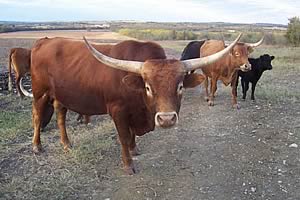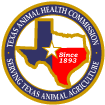 |
|||||||||
|
|||||||||||||||||||
|
|
Texas Cattle Trichomoniasis Program Adopted Beginning April 1, 2009, breeding bulls entering Texas from any other state must be either 24 months of age or younger and certified as a virgin, or be tested negative for cattle trichomoniasis within 30 days prior to entry.
The entry requirements are part of a regulatory package adopted by the commissioners for the Texas Animal Health Commission (TAHC) February 24 to address trichomoniasis, a venereal disease of cattle that causes infertility and abortions, and results in extended breeding seasons and diminished calf crops, which costs livestock producers valuable income. Cattle trichomoniasis is not a human health issue. The second phase of the program, which will address in-state movement of Texas breeding bulls, will go into effect January 1, 2010. “The TAHC Commissioners delayed the implementation of the intrastate, or in-state movement requirements, to January 1, 2010, to provide time to certify veterinarians to perform all components of the Trichomoniasis program, and to ensure producers are familiar with the disease, its implication to herd health, and the requirements for testing or certifying the virgin status of Texas breeding bulls undergoing change of possession,” noted Dr. Hillman. “We will be working closely with cattle industry organizations, Texas AgriLife Extension Service, the Texas Veterinary Medical Association and the Texas Veterinary Medical Diagnostic Laboratories to develop and deliver an effective information and education effort for cattle producers in Texas. We will be attending and making presentations at local, area and state producer and veterinary meetings to review the requirements and to ensure that producers are aware of the disease program. When the program is implemented, Texas breeding bulls undergoing change of possession must be officially identified with a USDA ear tag, official RFID tag, or breed registry tattoo or brand. The animals may be certified by the breeder to be virgins until the age of 24 months, as indicated by the presence of the animal’s two permanent central incisors in wear, or more simply, by the birth date recorded on the animals’ breed registry papers. The bull’s virgin status can be extended to 30 months, which was requested by commenters, provided the breeder and the herd’s accredited veterinarian certify on a breeder’s certificate that the bull facility is sufficient to prevent contact with female cattle. “After carefully considering the comments on the proposed regulations and discussions with the Trichomoniasis Working Group, the testing requirements for non-virgin bulls in Texas were revised to require only one PCR (Real Time Polymerase Chain Reaction test) on the non-virgin bull undergoing a change of possession, or alternatively, three consecutive culture tests, each conducted not less than seven days apart. Dr. Hillman noted that samples for testing must be collected by accredited veterinarians certified to conduct cattle trichomoniasis work, and tests will be run at the Texas Veterinary Medical Diagnostic Laboratory (TVMDL). “Seminars will be offered around Texas for accredited veterinarians to become certified, to ensure that the collection methods, paperwork completion, sample submission, disease reporting and management of infected bull herds are uniform throughout the state,” said Dr. Hillman. “Payment for sample collection and laboratory costs will be the responsibility of the producer,” explained Dr. Hillman. Bulls of unknown status may be sold for breeding with one negative RT-PCR test or three negative culture tests, each conducted not less than one week apart. The breeding bulls must remain separated from female cattle during the testing. Negative test results will be valid for 30 days, but only if the tested breeding bulls continue to be separated from heifers or cows. “Infected bulls will be restricted to movement for slaughter only, as there is no effective treatment for this disease,” said Dr. Hillman. “The remaining bulls in the herd will be held, isolated from female cattle, until they are tested, at least once more by PCR test, or twice more by culture, each culture conducted at least a week apart. If the remaining bulls test negative (each non-virgin bull in an infected herd must have at least two consecutive negative RT-PCR tests or at least three consecutive negative culture tests in order to be classified as negative), they are free to move.” “Producers who have encountered cattle trichomoniasis in their herd know how devastating this disease can be to their calf crop and production,” stressed Dr. Hillman. “This program is directly in response to producer and association requests for help to stop the spread of this insidious disease, and to stop the importation of infected bulls into the state. It is important to note that since this is an industry-requested program, input from the cattle industry is critical to the effective functioning of the program. To this end the rules contain provisions for the program to be reviewed annually by a broad-based Trichomoniasis Review Working Group, which can make recommendations on changes or even abolishment of the program.” “By enacting the interstate requirements now, we can address the importation of disease immediately,” he said. “Delaying the intrastate regulations until the first of next year will ensure that everyone can be ‘on board’ to attack this disease and protect their herds.”
|
||||||||||||||||||

|
|
||||||||||||||||||
| home | agri-services | pedigree
pen | news | dairy | beef | machinery quota | property | organisations | site map |
|||||||||||||||||||

